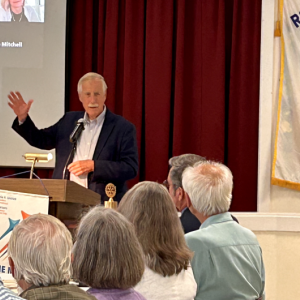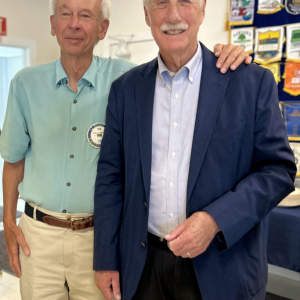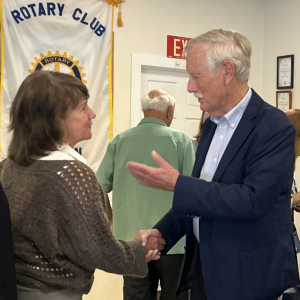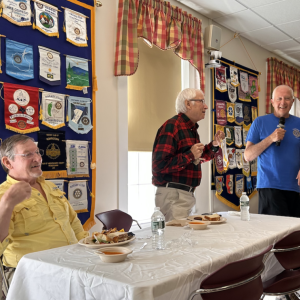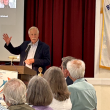Angus King visits Camden, outlines ‘10 Things You Didn't Know About the Senate’
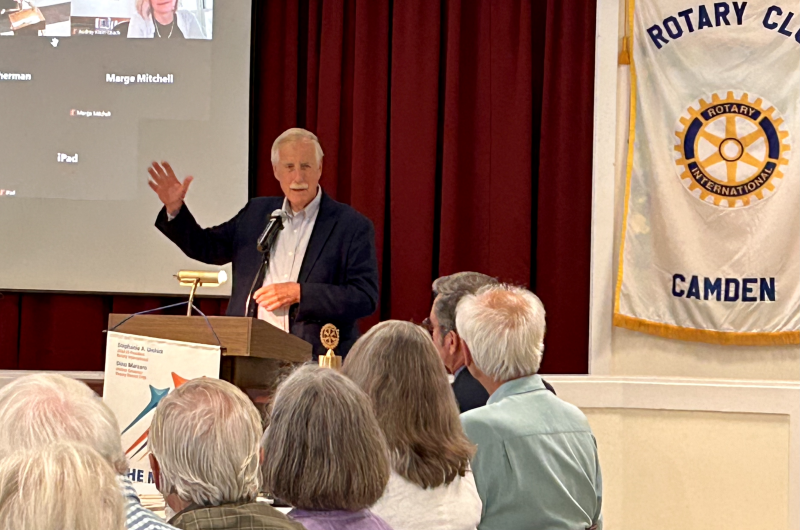 Maine Senator Angus King talks with Camden Rotary members Aug. 27, 2024, in the First Congregational church meeting room in Camden. (Photo by Lynda Clancy)
Maine Senator Angus King talks with Camden Rotary members Aug. 27, 2024, in the First Congregational church meeting room in Camden. (Photo by Lynda Clancy)
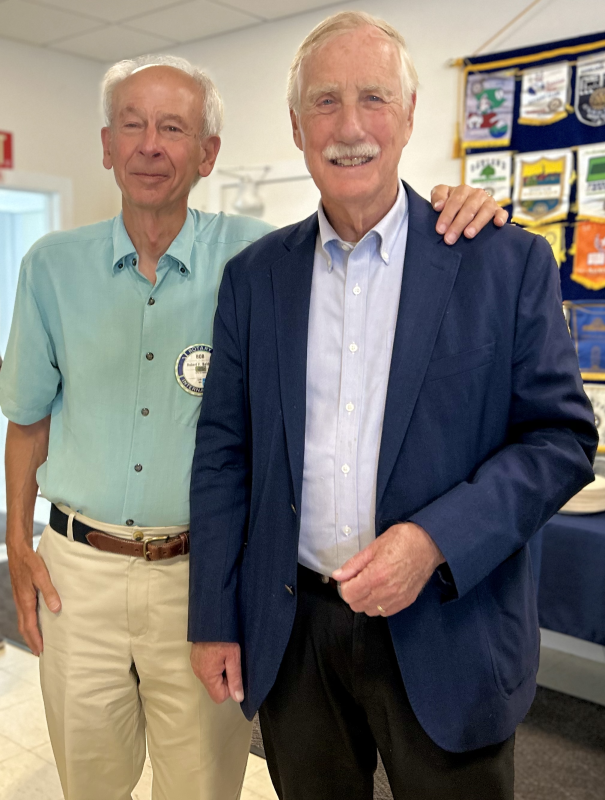 Rockport resident and Rotary member Bob Baldwin with college classmate and Maine Senator Angus King, Aug. 27, in Camden. (Photo by Lynda Clancy)
Rockport resident and Rotary member Bob Baldwin with college classmate and Maine Senator Angus King, Aug. 27, in Camden. (Photo by Lynda Clancy)
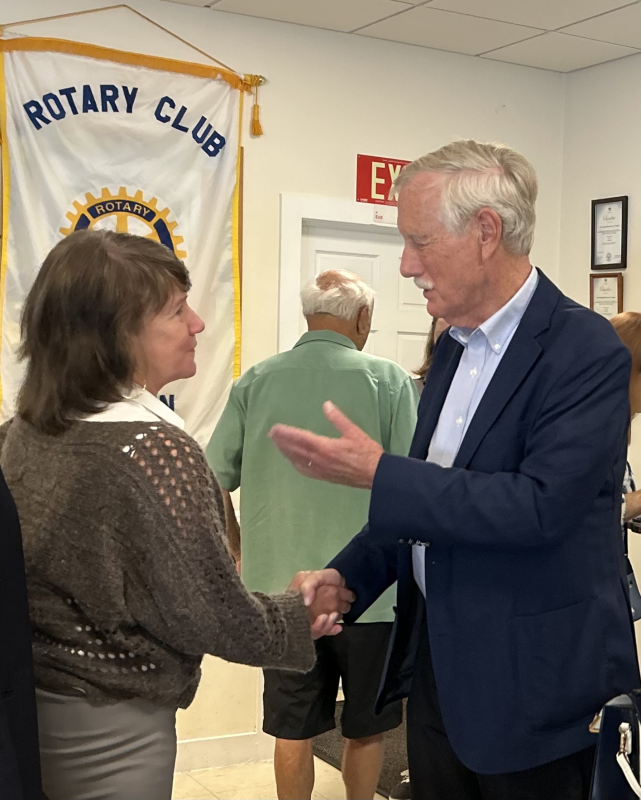
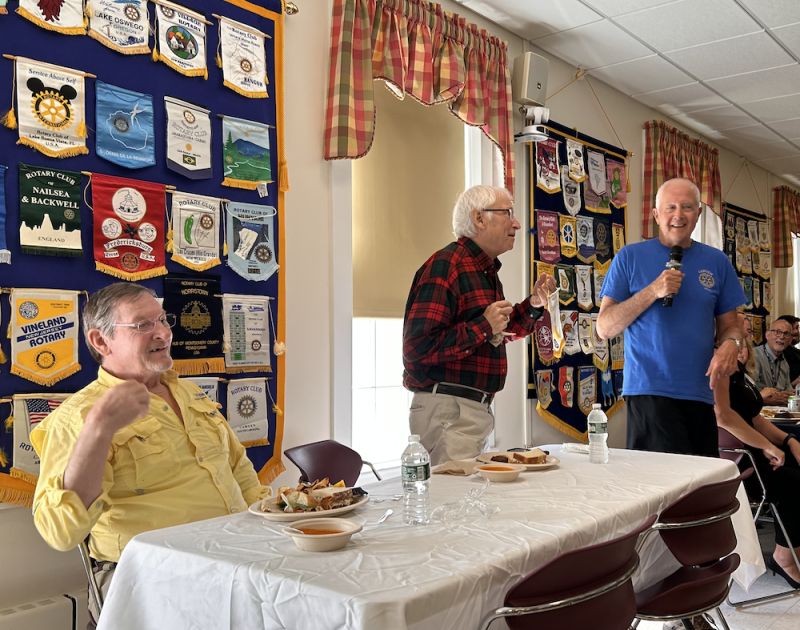 Camden Rotarian Graham Phaup (at right) introduced special guests Chris Practht, a member of the Camden, South Carolina, Rotary Club, and his friend Gordon McLeod.
Camden Rotarian Graham Phaup (at right) introduced special guests Chris Practht, a member of the Camden, South Carolina, Rotary Club, and his friend Gordon McLeod.
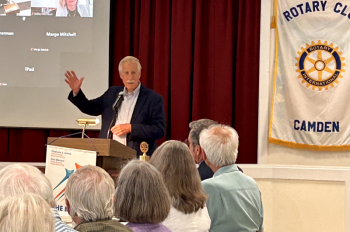 Maine Senator Angus King talks with Camden Rotary members Aug. 27, 2024, in the First Congregational church meeting room in Camden. (Photo by Lynda Clancy)
Maine Senator Angus King talks with Camden Rotary members Aug. 27, 2024, in the First Congregational church meeting room in Camden. (Photo by Lynda Clancy)
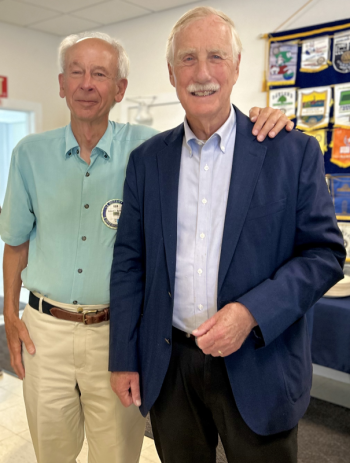 Rockport resident and Rotary member Bob Baldwin with college classmate and Maine Senator Angus King, Aug. 27, in Camden. (Photo by Lynda Clancy)
Rockport resident and Rotary member Bob Baldwin with college classmate and Maine Senator Angus King, Aug. 27, in Camden. (Photo by Lynda Clancy)
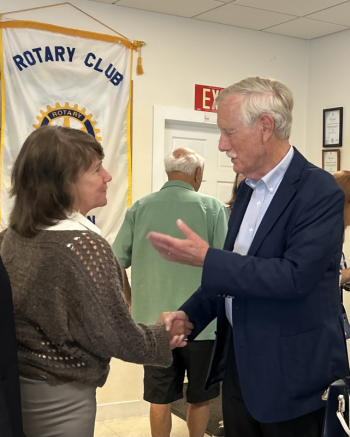
 Camden Rotarian Graham Phaup (at right) introduced special guests Chris Practht, a member of the Camden, South Carolina, Rotary Club, and his friend Gordon McLeod.
Camden Rotarian Graham Phaup (at right) introduced special guests Chris Practht, a member of the Camden, South Carolina, Rotary Club, and his friend Gordon McLeod.
CAMDEN — Maine Senator Angus King spent an hour with the Camden Rotary at its regular Tuesday noon meeting Aug. 27. At the podium in the Pilgrim Room of the First Congregational Church, he spoke about life in Washington, D.C., the political landscape of the country, and, with a bullet list in front of him, he described, “Ten Things You Didn’t Know About the Senate.”
“People have a wonderful opinion of Maine in Washington,” King said. “I was sitting in an intelligence committee meeting when Susan [Sen. Collins] was saying something. Sen. Martin Heinrich (D-New Mexico) leaned over to me and said, ‘is there something in the water in Maine that gives people common sense?’”
For Maine’s former governor (1995 to 2003) and longtime Brunswick resident, the Maine roads are familiar. In Rockport, his old college friend and classmate Bob Baldwin was waiting to take him to Rotary. They are both graduates of Dartmouth College, the Class of 1966, and while Camden resident Leslie Fillnow asked Senator King about, “the elephant in the room” — caps on age in government given the recent focus on President Biden, he responded (while noting he is “one year younger than Mick Jagger”, which makes him 80): “It is capped. The voters decide. What I have experienced is that people age differently. I saw Mick Jagger at Gillette Stadium a couple of months ago, and he is rocking. And I know people who are classmates of mine who are pretty old. It is an idiosyncratic thing.”
But he does believe that the Supreme Court could institute a term limit: “17 years, or some number so there is some regular turnover.”
Sen. King has been in politics since 1994, with years off that included touring the country in an RV. He wrote a book about that adventure: Governor's Travels: How I Left Politics, Learned to Back Up a Bus, and Found America. In 2013, was elected to the U.S. Senate, where he has since served. He also ran a law practice, was a reporter, and owned a business. An Independent, he is up for reelection Nov. 5, and he is running against David Costello (D), Demi Kouzounas (R) and Jason Cherry (Independent).
At Camden Rotary, he was amongst Maine peers, many of them the same generation, plus a healthy contingent of younger members. King spoke broadly for 45 minutes about his time in D.C., followed by a 15-minute question and answer period. Rotarians are strict about their schedule, beginning promptly at noon with lunch and concluding at 1 p.m. King, likewise, was on a whirlwind, as Congressional delegates often are when they are back in Maine.
But for that hour, King had the audience thinking about national and international affairs. And he had them laughing, especially when relaying jokes he shares with his colleagues across the aisle.
“When I first got there [to D.C.], there were 14, now there are a dozen former governors in the Senate,” he said. “At one point, we decided we were going to have a former governors’ caucus. Governors tend to be less partisan, because they have to work with the Legislature, and they are pragmatic. One day I went over to Mitch McConnell (R-Kentucky and Senate Minority Leader) and said, ‘Mitch, I want you to know we are forming a former governors’ caucus because we think we can help get things done.’ And he said, ‘well, Angus, I’ve noticed if you have a former governor who is now a senator, and you ask them which job they like better, if they say senator, you know they are lying to you about other things.’”
That was the only time King said he’d ever heard, “Mitch tell a joke.”
King had prepared his delivery, “Ten Things You Didn’t Know About the Senate,” adding, “the nice thing about 10 things is you know exactly where I am in the speech.”
1) “We don’t hate each other.”
The press likes conflict, he said, and using the word “toxic” when describing Senate affairs.
“That is absolutely not true,” he said. “We get along well. Not all the time. There’s friction, of course, and disagreements. And there are some people who are more disagreeable than others.”
He mentioned Senator Ted Cruz (R-Texas), who was elected in 2012, the same year that King had been elected by Maine voters.
“Ted and I probably disagree 90 percent of the time, but there is 10 percent of the time when we agree. That is what we ought to hold onto.”
He cited a bill that he and Cruz cosponsored which limits children’s access to social media before the age of 13. Opportunities such as those to work should be seized, he said.
2) The schedule.
“One of the real problems today is the schedule,” said King.
He worked in the Senate in the 1970s as a staff member, and noticed when he got to the Senate in 2013, “there was a difference in atmosphere, particularly a difference in relationships.”
The current schedule requires delegates to be in D.C. on Monday afternoons by 5 p.m. for the first vote. The last vote is Thursday afternoon, around 2 p.m.
“So what do you suppose happens,” he said. “Everybody goes to the airport Thursday afternoon and they don’t come back until Monday afternoon.”
The compressed week results in no social life, “no hanging out,” he said. “We literally don’t know each other.”
In the 1970s, senators lived in the D.C. area, along with their families. That is no longer the case.
“It is hard to deal with difficult issues if you do not have relationships and trust, and you cannot have that if there literally isn’t the time,” he said.
3) “The Senate would be unconstitutional if it were not in the Constitution.”
Apportionment is lopsided, said King.
“California has two senators, and Maine has two senators,” he said. “By the way, I like that part. But if you stop and think about it, it is very protective of the minority. The framers originally conceived of the Senate as a compromise. The Senate was conceived as a representative of the states, not of people. Until 1916, the Senate was elected by state representatives. It was not popularly elected until 100 years ago.”
That produces a disproportionate counting of the votes between states with small populations, he said. A few years ago, 18 U.S. senators represented half of the country, and the other 82 represented the other half.
“It is oriented toward rural areas. You put the filibuster on top of that, which requires 60 votes, and then you are really talking about disproportion; 24 percent of the country can stop anything.”
But he is not suggesting change.
“The framers wanted the Senate to be kind of a calming body,” he said.
4) Filibusters
“I went down [to Washington] 12 years ago to do away with the filibuster,” said King. “But I’ve modified that view.”
King quoted Senator Carl Levin, D-Michigan, who was Chairman of the Armed Services Committee. Levin said: “Today’s obnoxious obstruction can be tomorrow’s priceless shield.”
“Do you see what I mean,” asked King. “You hate it when they are blocking what you want to do, but you might want it when the other side takes control and does something you might not like.”
Filibusters represent a tough issue, given the execution today of how filibuster votes are presented (delegates do not have to be present to vote, anymore).
“I don’t think [the filibuster] should be abolished,” he said. “There should be more effort required in order to impose a true minority view on the rest of the country.”
5) It really matters who is president
It matters in small ways, such as who is appointed to boards and commissions, or other positions of power, “that have tremendous influence on our lives.”
6) Staff is really important
“When you elect somebody, you are really electing a group, because you cannot do it yourself,” King said. “I get between 3,500 and 4,000 calls and emails to my office from Maine each week. From Maine! I’ve got to have people to help me with that.”
He has five: “smart young people whose job it is to draft answers. Then I go home at night — I feel like I am a sophomore in high school — with a looseleaf binder full of letters. I read all of the responses and edit them.”
Staff become his ambassadors, who work with other offices, who help form policy, and do research. Every Monday afternoon, they meet to talk about issues.
7) Leaders have enormous power in the Senate
It used to be that the power was in the committee chairs. Now, “I think since LBJ,” the power of agenda-setting sits with the majority and minority leaders and the the speaker of the house, said King.
But something interesting is trending, he said: “A lot, if not most, of what we have accomplished happened organically from within small groups within the Senate rather than from the White House or the leaders.”
He cited the bipartisan infrastructure bill, whose roots are with a bipartisan group of senators.
The leaders do have a lot of power but there is evolving a kind of, “grassroots revolt of people saying, ‘we were elected, too, and we want to try and get some of these things done.’”
8) Divisions in the Senate really reflect divisions in the country
Why is the country divided? Something has changed in current lifetimes in terms of access to information, and the proliferation of different sources has changed the tenor of the country.
He posed a question to Rotarians: “Where did you get your information growing up?”
“Walter Cronkite,” most in the room murmured.
The news business today is Balkanized, said King. And there are different sources are, “manifestly biased.”
He cited the phenomenon of ‘confirmation bias’, seeking out the source of information with which one already agrees.
“And that has divided us into camps based on the information we get,” said King. “It has a created a situation where people in the country are in different factual universes.”
And the business of news outlets is keeping viewers agitated and angry.
“If you watch Rachel Maddow you are angry at Trump and if you want Fox you are angry at Kamala Harris or Joe Biden,” said King. “This country is divided and it is no surprise that politics are divided.”
His practice, to sit people down at the table and establish a common understanding of the facts, makes it easier to get to the solution, which are sometimes obvious. But the work lies in establishing the facts.
The use of algorithms exacerbates the process of obtaining information by targeting internet searches.
“Wayfair is sure I needed a sofa,” King said. “I have been getting sofa ads every two days because I think I once searched for a sofa. I don't mind if an algorithm is used to sell me stuff. I don’t like it when it is used to sell me ideas. That is what is dangerous. It pushes people further and further away from each other.”
9) The tyranny of the primary
Divisive politics are evident in coloring the states red and blue, and the gerrymandering of districts.
“In many, many places the primary is the election,” he said. “If you get the Republican nomination for Congress in the panhandle of Florida and you have a pulse, you are going to be the Congressman. The general election is not a big deal. The same thing is if you are Democrat and get the nomination in the 17th District of Manhattan.”
And, the average turnout in primaries around the country is 21 percent of the party voters. Those voters tend to be the activists – with the Democrats, they would be the most progressive; with the Republicans, the most MAGA.
“The result is we get people coming to Washington who are just miles apart,” he said. “And you can now lose the primary, not because of your position on abortion or Ukraine, but because you are viewed as not being sufficiently hostile to the other side.”
Compromise is a dirty word, he said. “But without it, our system is completely paralyzed.”
He referenced Margaret Chase Smith (R-Maine) who served as U.S. Senator for 24 years, after serving as a Congresswoman for nine years. She had illustrated to King the nature of Washington, D.C., during the McCarthy era, when, “you were afraid of who you had lunch with in the Senate dining room. It was guilt by association. That’s now becoming the case in the U.S. Senate. I know people who are afraid of being seen trying to work things out.”
Solutions include the nonpartisan primary, such as Alaska’s jungle primary, which means anybody can run, with four top finishers. Those four go on to the general election which is decided by rank choice voting.
California has an open primary with two top contenders running for general election.
10) Governor or Senator, which job is better?
“Governor is more fun in the sense that you are one voice, you can set the agenda, and see things getting done,” said King. “That’s pretty satisfying because this is a frustrating business. Senator is much more frustrating because the framers were very afraid of concentrated power. The Constitution is a a Veg-O-matic of power. It is designed to divide it up into pieces. Senate, House, two-third votes, vetoes, power in the states, localities. Their frame of reference was George III, and so they were concerned about power being concentrated in any one set of hands. ‘All power corrupts and absolute power corrupts absolutely [Lord Acton]’.”
King continued: “History tells us that. The framers wanted our system to be cumbersome, slow and complicated. And they succeeded beyond the wildest dreams.”
What is good about the Senate, in King’s mind: “You can deal with it at the highest level. I get to cross-examine the Secretary of Defense. I have the two greatest variety of subcommittees in the U.S. Senate. I am chair of the Strategic Forces Subcommittee of Armed Services — that’s a euphemism for nuclear weapons — and my other subcommittee is National Parks. You do occasionally get a chance to work on something that is really important, that makes a difference in peoples’ lives.”
He mentioned rural broadband access and the nine-year effort to effect that, finally including it in the infrastructure bill.
“I am told by the guy who runs the program here in Maine that as of the end of this year, 95 percent of the people in Maine will have access to broadband, a huge change and a huge opportunity for Maine.”
The Tuesday lunch wound down with questions from the audience.
Back to term limits: “I supported term limits in 1993 when they were voted through by referendum [in Maine] for the Legislature, and then I was Governor for eight years,” he said. “I saw a lot of the power and authority of the Legislature leak away, and you had to relitigate issues every two or three years, and expertise was lost. A lot of power went to the Governor, and to the lobbyists. I concluded after that experience that it makes sense to let the voters decide. If you have somebody you really like, why should you have a rule that says, ‘no, you cannot vote for them.’”
King said he thought long and hard about running again for a Senate seat this year. Two years ago, he had decided not to, but, “I changed my mind, and I am not going to say anymore because this is not an appropriate place for politics, I’m told.”
About changing the Congressional schedule, he suggested instituting five-day weeks for four weeks and then a week home.
China and Taiwan, war: “The cornerstone of our defense strategy is deterrence, that is, the best war is the one that does not happen. The reason it does not happen is that the other side is convinced that an attack of some kind will cost them more than they will gain. That’s the whole concept.For that reason, we are supporting the Pacific Fleet and upgrading our capacity working with the Taiwanese.
“The issue is emotional to the Chinese. It is cultural. They believe and feel that Taiwan is part of China and should be part of China. So the question is whether they judge the gain by somehow reuniting Taiwan by force agains the cost is a calculation they have to make, and we have to be sure that stye believe there would be a significant cost.
“A question I keep asking is about the will to fight. How will the Taiwanese feel? We had a lesson in Afghanistan and Ukraine, almost simultaneously about the importance of the will to fight. In Afghanistan the country collapsed as soon as we left. In Ukraine, the people stepped up ferociously even before they had help from us and other European countries.”
Are the Taiwanese committed as the Ukrainians were at defending their country, he asks. Or, do they not care as much about being part of China.
“We are following that closely,” he said. “If we are going to commit American force, we should be sure the people we are committing on behalf of are all in, too.”
About the deficit increase (projected to be $1.9 trillion): “If there is a solution, I would be running for president,” King said.
He and staff examined the federal budget from 1962 to 2024 in percent of gross domestic product, “which is apples-to-apples instead of how many dollars.”
In 1962, domestic discretionary spending – food stamps, federal departments and agencies, Smithsonian, all domestic spending — was 4 percent of GDP, he said.
In 2024, it was still 4 percent of GDP.
In 1962, defense was 9 percent of GDP.
In 2024, defense is 3 percent of GDP.
“Defense, as a percentage of our economy is two-thirds reduced from what it was 40 years ago,” King said.
In 1962, defense and non-defense discretionary spending represented 70 percent of the federal budget. The other 30 percent was mandatory spending – Social Security, Medicare, Medicaid.
In 2024, those numbers are reversed. Defense and non-defense discretionary represents 30 percent of the budget and 70 percent is mandatory.
“That is where the growth in the budget in the budget, and a lot of that growth is in health care,” he said. “It drives me crazy that Medicare will pay for broken hip [surgery] but they won’t pay for a nonslip mat in your shower. It won’t pay for a grab bar. It won’t pay for prevention. I think that is low-hanging fruit. Medicare was set up to pay for treatment. We need to pay for prevention.”
Food stamps and education are a tiny piece of the federal spending.
“You have to talk about revenues,” said King.
In the 1980s, corporations paid 26 percent of the federal revenues.
“Now it is 6 percent, and a lot them are not paying anything,” he said. “We have to be careful about not stifling the economy, but you cannot talk about the debt and the deficit without talking about drastic cuts somewhere, or revenues. They are two sides of the equation.”
Reach Editorial Director Lynda Clancy at lyndaclancy@penbaypilot.com; 207-706-6657

